|
| NEWS |
 |
| New SIPRI data—declining trends in multilateral peace operations continued in 2019 |
| While the number of United Nations and non-UN multilateral peace operations increased slightly in 2019, the number of personnel deployed in them decreased, according to new data from SIPRI. Although sub-Saharan Africa maintained the highest number of operations and personnel, two new operations in the Middle East and North Africa may signal a shift in regional focus. |
|
|
Read more | Read the SIPRI Fact Sheet | Access the database
|
|
|
 |
| 2020 Virtual Stockholm Forum on Peace and Development—an online success |
|
On 11–22 May, the Stockholm Forum on Peace and Development was held online for the first time. The Virtual 2020 Stockholm Forum featured 41 partners, 44 sessions and over of 3700 registered participants from 167 different countries. The session on ‘Sustaining Peace in the Time of COVID-19’ generated a particularly high level of interest and has been viewed on SIPRI’s YouTube channel over 4800 times. The Stockholm Forum on Peace and Development has been jointly organized by the Swedish Ministry for Foreign Affairs and SIPRI since 2014.
|
|
|
Read more | Watch the Stockholm Forum YouTube playlist | Read the Stockholm Forum Daily
|
|
|
 |
| SIPRI launches new initiative to address the negative impact of environmental crises |
|
Ahead of the 50th anniversary of the Stockholm Conference on the Human Environment, SIPRI has launched a new initiative that aims to focus international attention on practical steps to address the negative impact of today’s environmental crises in order to improve tomorrow’s prospects for peace and security. The ‘Environment of Peace 2022’ initiative is led by SIPRI under the guidance of a distinguished panel of international experts.
|
|
|
Read more | Read about SIPRI’s Climate Change and Risk Programme
|
|
|
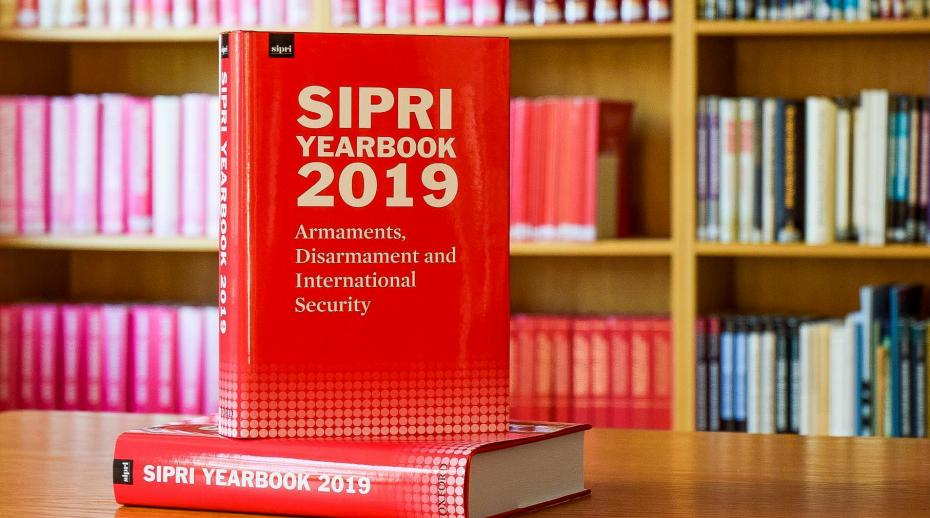 |
| Ukrainian translation of SIPRI Yearbook 2019 now available |
|
SIPRI, in collaboration with the Razumkov Centre (the Ukrainian Centre for Economic and Political Studies), is pleased to e-launch the Ukrainian-language translation of SIPRI Yearbook 2019. This is the 20th Ukrainian-language edition of the SIPRI Yearbook. The translation was made possible by the long-time cooperation between SIPRI and the Razumkov Centre and with the financial support of the Swiss Federal Department of Defence, Civil Protection and Sport.
|
|
|
Read more | Download the Ukrainian translation of SIPRI Yearbook 2019 (PDF) | Watch the e-launch (in Ukrainian)
|
|
|
|
| COMMENTARY |
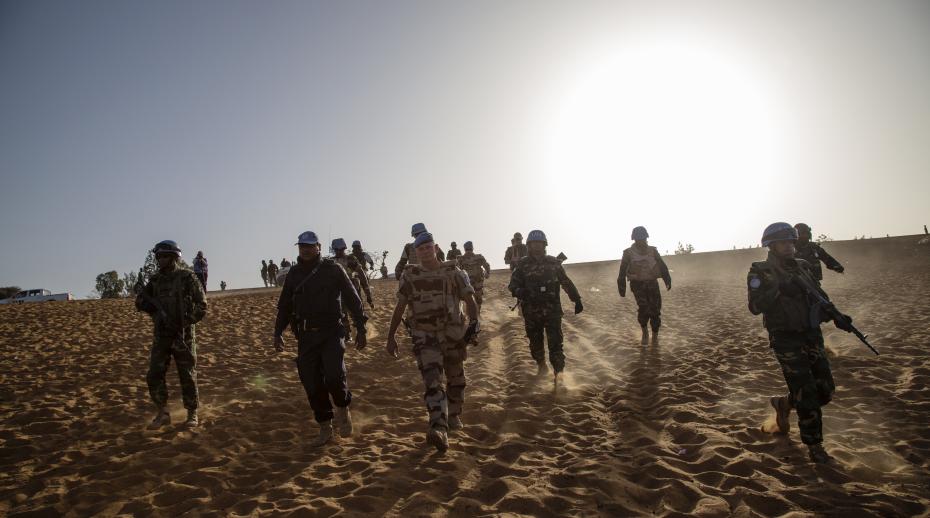 |
| The impact of the Malian crisis on the Group of Five Sahel countries: Balancing security and development priorities |
| As part of research conducted from January until November 2019, SIPRI’s Sahel and West Africa Programme and its partners in the Sahel region documented the spillover effects of the Malian crisis on the Group of Five (G5) Sahel countries: Burkina Faso, Chad, Mali, Mauritania and Niger. This SIPRI Topical Backgrounder analyses regional and national policy responses that—with limited success so far—aim to address key security challenges. |
|
Read the SIPRI Topical Backgrounder
|
|
|
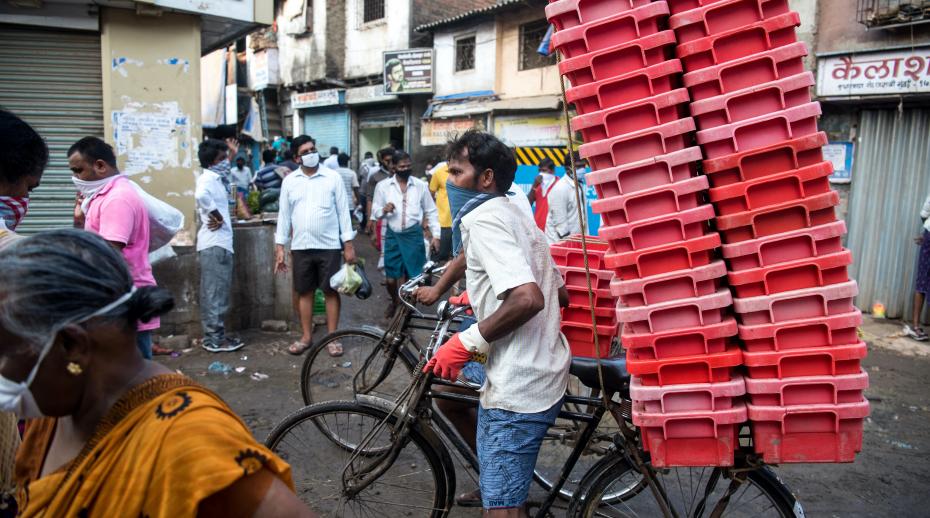 |
| Coronavirus shocks to human development and sustaining peace |
| The pandemic caused by coronavirus disease 2019 (COVID-19) is a massive systemic shock entailing both a public health catastrophe and a profound economic crisis. The dual crisis lays bare cleavages and structural weaknesses both in individual countries and in the highly interconnected global system. It poses a critical challenge to governments and multilateral institutions to formulate and implement an effective and coherent response. This WritePeace blog briefly examines the dual crisis especially as it affects countries of the Global South. |
|
Read the WritePeace blog
|
|
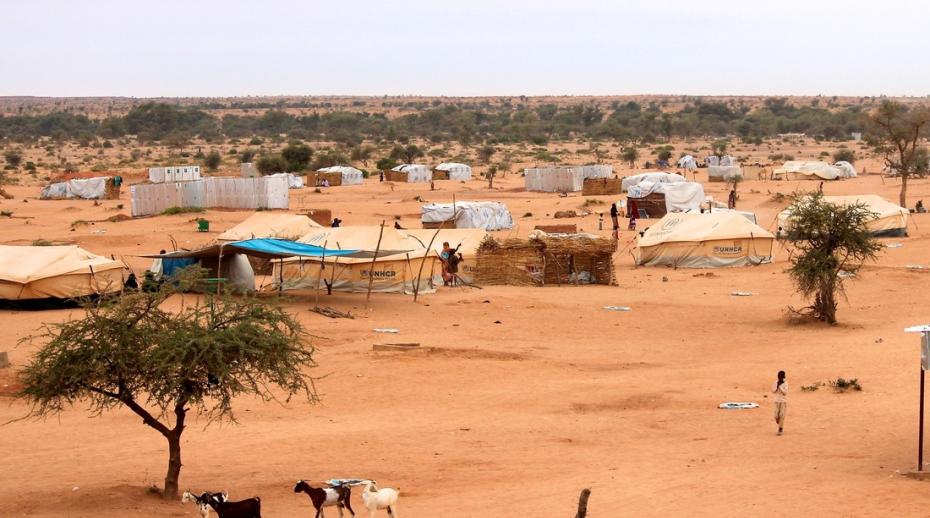 |
| Importing the Malian conflict to the Group of Five Sahel countries: The case of the Ayorou refugee camp in Niger |
| This SIPRI Topical Backgrounder is part of a series of research outputs by SIPRI’s Sahel and West Africa Programme on the effects of the Malian crisis on the other G5 Sahel countries. It is based on existing academic work and field research undertaken in Ayorou, in the Tillabéri region of Niger. The SIPRI Topical Backgrounder explores the living conditions of refugees and the effects of their presence on local communities and dynamics in peripheral regions. |
|
Read the SIPRI Topical Backgrounder
|
|
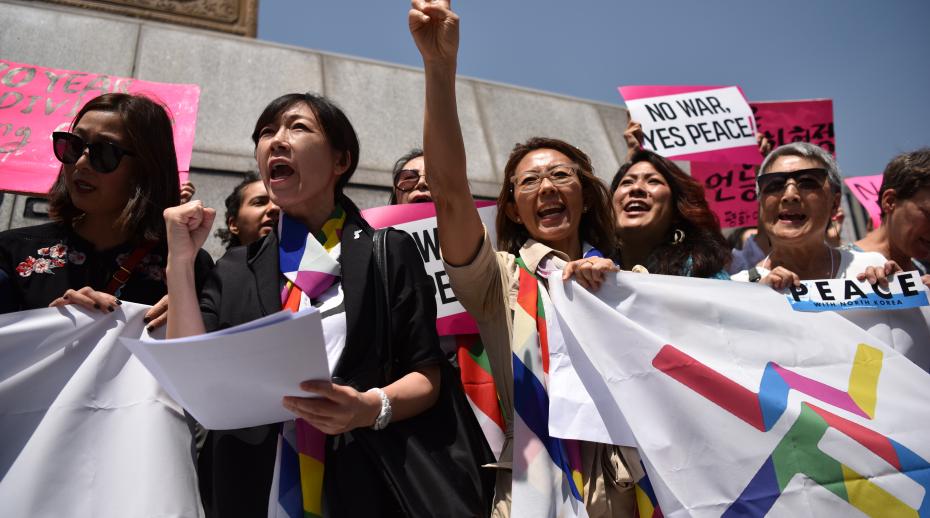 |
| From grassroots to peace talks: Women in the inter-Korean peace process |
| Despite some hurdles, the last two years have seen hope return to the inter-Korean peace process. This SIPRI Topical Backgrounder revisits the inter-Korean peace process with a focus on women’s participation, from grassroots movements to peace talks. It examines how Korean women have been involved and the characteristics of their participation especially in relation to the upcoming 20th anniversary of UN Security Council Resolution 1325 on women, peace and security in October 2020. |
|
Read the SIPRI Topical Backgrounder
|
|
|
| UPCOMING EVENTS |
| |
| 18 November 2020 |
| 2020 Stockholm Security Conference |
|
On 18 November 2020, SIPRI will host the fifth annual Stockholm Security Conference. The theme of this year’s conference is ‘International Cooperation: Navigating the Way Ahead’. As a result of the success of the first Virtual 2020 Stockholm Forum on Peace and Development, the Stockholm Security Conference will be convened online.
|
|
Read more
|
|
|
| STAFF NEWS |
| |
| Current staff news and vacancies: |
|
- SIPRI mourns the passing of Arthur H. Westing (United States), a former SIPRI Researcher who died on 30 April 2020 at the age of 91.
- Research Assistant, Arms and Military Expenditure Programme (Closing date: 1 June).
|
|
Read the in memoriam notice | Check SIPRI’s vacancies
|
|
|
| PUBLICATIONS |
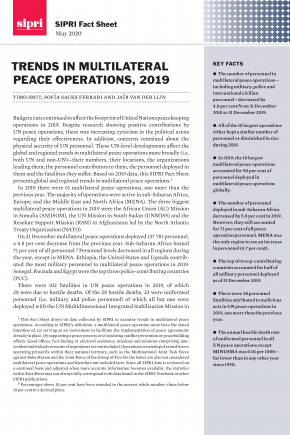 |
| Trends in Multilateral Peace Operations, 2019 |
|
Despite evidence of their positive impacts, UN peacekeeping operations continue to face budget cuts, cynicism in the political arena and concern over the physical safety of personnel. This context underpins the global and regional trends in multilateral peace operations in 2019. This SIPRI Fact Sheet gives a snapshot of multilateral peace operations in 2019, with statistics on personnel, country contributions and fatalities for operations conducted by the UN, regional organizations or alliances, and ad hoc coalitions of states.
|
|
Read the SIPRI Fact Sheet
|
|
|
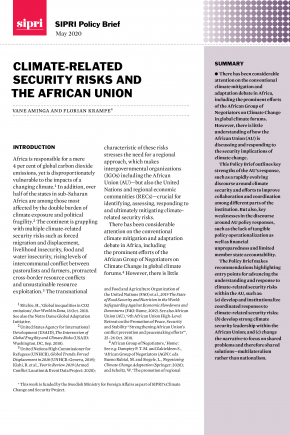 |
| Climate-related Security Risks and the African Union |
|
There is little understanding of how the African Union (AU) is discussing and responding to the security implications of climate change. This SIPRI Policy Brief outlines key strengths of the African Union’s response, such as a rapidly evolving discourse around climate security and efforts to improve collaboration and coordination among different parts of the institution. It also discusses the key weaknesses in the discourse around AU policy responses, such as the lack of tangible policy operationalization as well as financial unpreparedness and limited member state accountability.
|
|
Read the SIPRI Policy Brief
|
|
|
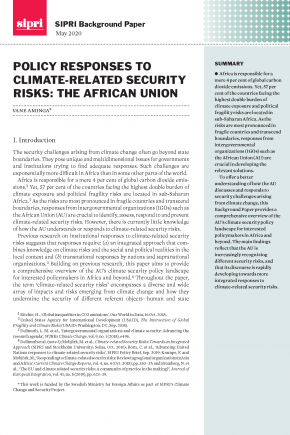 |
| Policy Responses to Climate-related Security Risks: The African Union |
| To offer a better understanding of how the AU discusses and responds to security challenges arising from climate change, this SIPRI Background Paper provides a comprehensive overview of the AU’s climate security policy landscape for interested policymakers in Africa and beyond. The main findings reflect that the AU is increasingly recognizing different security risks, and that its discourse is rapidly developing towards more integrated responses to climate-related security risks. |
|
Read the SIPRI Background Paper
|
|
|
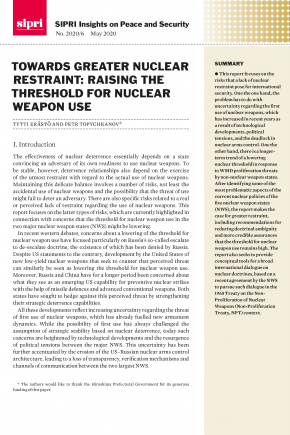 |
| Towards Greater Nuclear Restraint: Raising the Threshold for Nuclear Weapon Use |
| This SIPRI Insights on Peace and Security focuses on the risks that a lack of nuclear restraint pose for international security. On the one hand, the problem has to do with uncertainty regarding the first use of nuclear weapons, which has increased in recent years as a result of technological developments, political tensions, and the deadlock in nuclear arms control. On the other hand, there is a longer-term trend of a lowering nuclear threshold in response to weapons of mass destruction proliferation threats by non-nuclear weapon states. The paper makes the case for greater restraint, including recommendations for reducing doctrinal ambiguity and more credible assurances that the threshold for nuclear weapon use remains high. |
|
Read the SIPRI Insights on Peace and Security
|
|
|
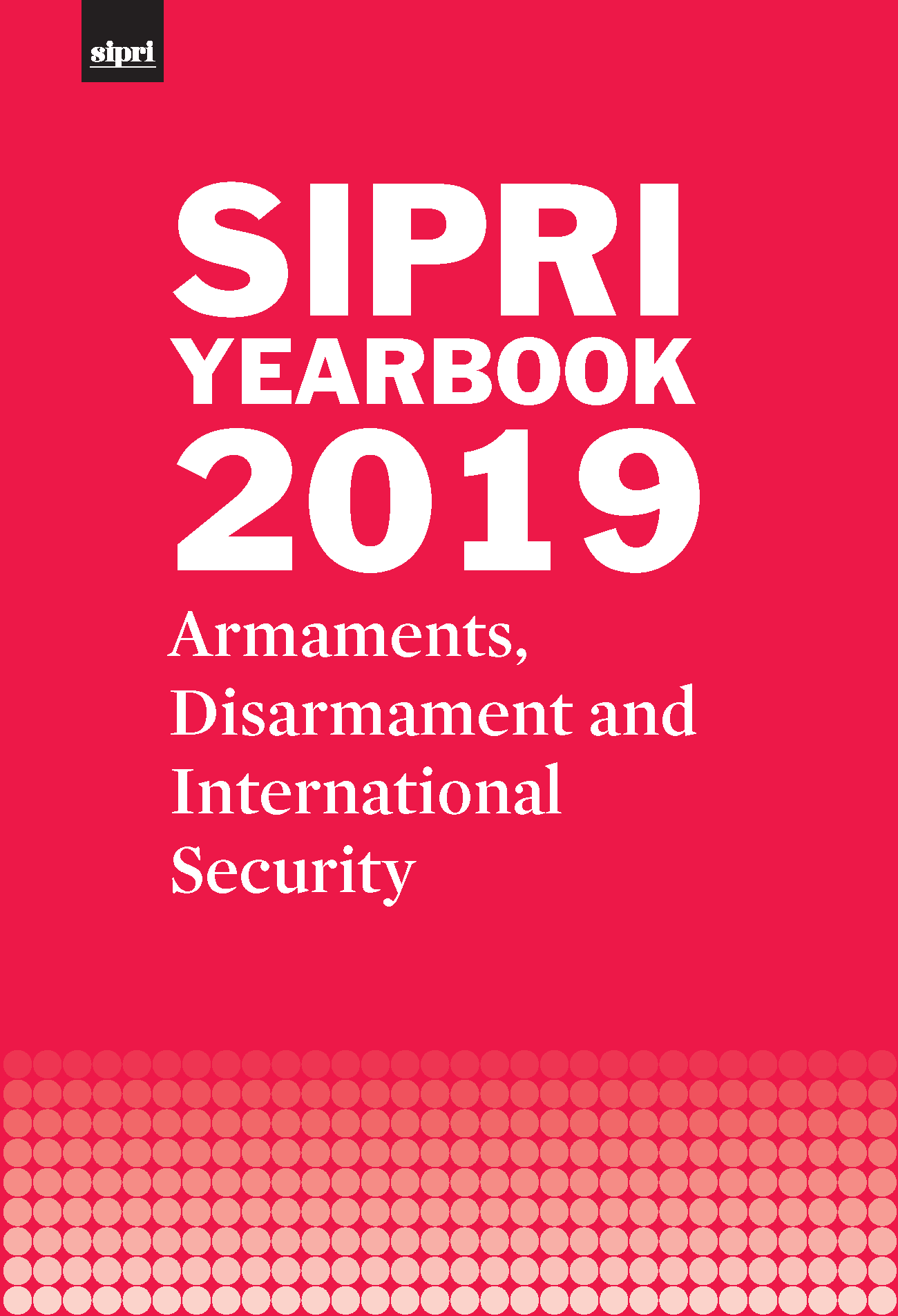 |
| SIPRI Yearbook 2019 |
The 50th edition of the SIPRI Yearbook is a compendium of data and analysis in the areas of security and conflicts; military spending and armaments; and non-proliferation, arms control and disarmament. It covers developments during 2018, including:
- the state of nuclear arms control;
- transparency in military spending;
- UN peacekeeping reform; and
- allegations of chemical weapon use in Syria and the United Kingdom.
|
|
Browse the contents page | Read the summary (PDF) | Order SIPRI Yearbook 2019
|
|
|
| |
|
|
|
|